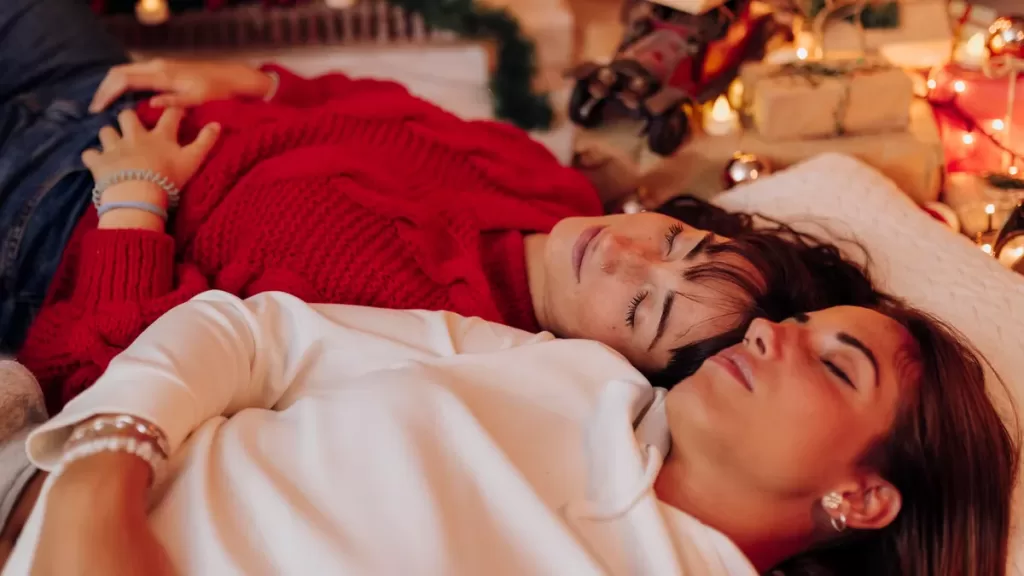

In the United States, Americans shop, eat, and host a lot within a short 5-6 weeks: Thanksgiving to New Year’s Day. Besides the end-of-year parties at work, end-of-year burnout is a real issue plaguing everyone.
For those balancing work and families, school breaks are frequent and long, causing daycare issues and time off from work. Parents must work together to use paid time off or work from home. And that does not include any sick days needed for the sniffles or flu. To ensure less stress, think about these tricks.
- Start early. Do not leave all your holiday shopping to the week before Christmas. By shopping early, you stretch your budget, increase time to buy, and leave space in your schedule for commitments. Procrastination leads to additional anxiety that can prevent a full night sleep.
- Balance the calendar. Write everything out on a calendar so you can see how busy the holiday schedule is visually. This can help clear the schedule to remove unnecessary activities easing the burden of business.
- Lay off the overeating. Sugary desserts, late-night parties, and buffets mess up your tummy. Keep snacking to a minimum and plan ahed for a game plan. The last thing your body needs is extra pounds or acid reflux at bedtime.
- Get outdoors. With the days shorter in the late fall and winter months, soaking up whatever light is available helps boost your energy. Your circadian rhythm reacts to the natural cycles of daylight and darkness to regulate your internal clock. Increasing your natural daylight exposure produces a healthier, faster sleep.
- Decrease the alcohol. Your sleep can easily decrease the REM cycle with too much alcohol. The drowsiness can also affect the sleep cycle if experienced too early. Alcohol relaxes your muscles, including those in your throat, allowing these muscles to more easily fall back into your airway during sleep and cause obstructions.
Overall, the holidays create stress on the budget and schedules. But it also disturbs sleep routines. Follow a few of these tips to survive the holiday bustle.
- Relax. Find time for a massage or yoga. Drink herbal tea, listen to soothing music, or read a book prior to sleeping.
- Hire help. Price out a caterer to make your pies or a maid to clean the bathrooms. Whatever can take some pressure off your mind around the house will help reduce the anxiety of a clean house or perfectly baked pies.
- Exercise. Shift your schedule to late afternoon walks or aerobic activity. Exercising elevates the heart rate and temperature. Once it settles back will lead to sleepiness right in time for bed.
- Positivity. Take note of all the things you are grateful for. Write down a daily gratitude list to look back and appreciate everything you love about the season.
- Sleep routine. Don’t break the routine. Say no to a few parties if you need to prioritize sleep or family activities. Without 7 to 8 hours sleep for adults, you risk moodiness, fatigue, and your immune system.
The 4-7-8 breathing technique
Stemming from pranayama, an ancient breath technique from yogic practices in India, the 4-7-8 breathing technique is picking up steam in medical circles to help ease anxiety and stress before bedtime. Popularized by Andrew Weil, M.D., the 4-7-8- breathing technique involves controlling your breath in different styles and lengths.
To try the 4-7-8 breathing technique, follow these easy instructions from Dr. Weil or visit his website to watch videos.
- Exhale completely through your mouth, making a whoosh sound.
- Close your mouth and inhale quietly through your nose to a mental count of four.
- Hold your breath for a count of seven.
- Exhale completely through your mouth, making a whoosh sound to a count of eight. This is one breath.
- Now inhale again and repeat the cycle three more times for a total of four breaths.
For some, families induce anxiety due to separation or conflict. Try to prepare yourself before a holiday event or dinner to prevent any blow-ups between family members. Contact family members prior to a gathering to discuss any unresolved conflicts or to set a price limit on gifts. The last thing you want is to leave angry or more anxious.
Tryptophan commonly gets the blame for your post-turkey-feast hangover. Tryptophan is an essential amino acid that our bodies cannot produce. Therefore, we need to get tryptophan from our diets. Once turkey is eaten, our bodies use the tryptophan to make niacin, which is a B vitamin that produces serotonin. Serotonin is a chemical that transmits impulses between nerve cells and contributes to our well-being and happiness.
Some take a Thanksgiving nap after eating because of the high consumption of starches and tryptophan. But if it is not an irregular reaction to your schedule, it may not be the holidays or turkey at all.
If you are suffering from daytime sleepiness, whether constant after the holidays or fleeting during the holidays, you may have an undiagnosed sleep disorder. To get help and start getting the sleep you deserve, contact your local sleep specialist for a complete diagnosis of your sleep behavior and learn how you can get the quality of sleep you need.
Connect with the Alaska Sleep Clinic for a free consultation to prioritize your health ahead of the busiest season of the year.

